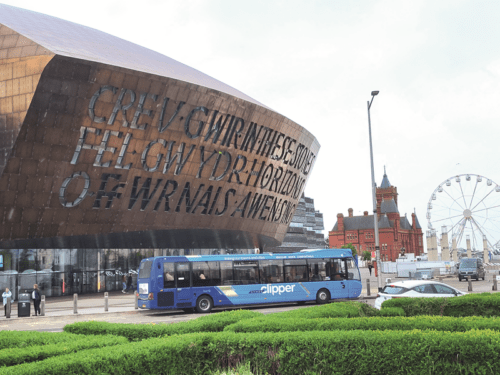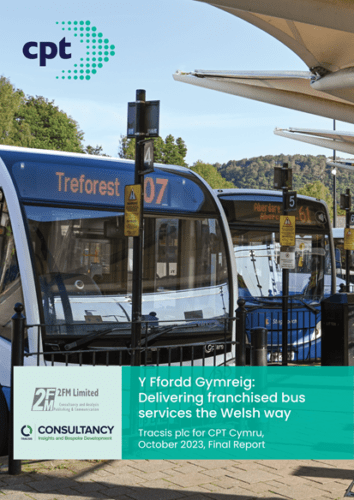
Director of CPT Cymru Aaron Hill outlines the background to the CPT’s two recent reports looking at bus services in Wales and how a franchising system can be put in place that works for government, users and operators alike
Buses are an essential part of the social and economic fabric of Wales. With nearly one in five of the Welsh population having no access to a car, buses are a lifeline to many people. As the most popular form of public transport in Wales, our industry helps around 100 million people every year to get to work, to visit friends and family, and to do their shopping and access vital services.
However, in the years since the start of the Covid-19 pandemic, bus services have been under unprecedented pressure in Wales. The overnight loss of passengers through lockdowns has been followed by interminable economic volatility, alongside long-term changes in the way people work and move around their communities. For the last three years, a combination of emergency and transition funding from the Government has provided a lifeline to ensure bus services are able to continue running in many parts of the country.
But the pandemic didn’t start the decline of bus patronage in Wales. The prevailing narrative from decision makers has been that the commercial model, and the de-regulation of bus services has failed, but the truth is far more complicated than that. The long-term reduction in the numbers of people travelling on buses began in the 1950s, prior to de-regulation, and has been exacerbated by increased car ownership and car-friendly policies, changes on the high street, and an overall reduction in the number and range of bus services provided.
[wlm_nonmember][…]By subscribing you will benefit from:
- Operator & Supplier Profiles
- Face-to-Face Interviews
- Lastest News
- Test Drives and Reviews
- Legal Updates
- Route Focus
- Industry Insider Opinions
- Passenger Perspective
- Vehicle Launches
- and much more!
In the ten years prior to the pandemic, the pressure of austerity on Welsh Government and local authority budgets saw the mileage supported by government reduce by more than 50%. At the same time, operators increased their commercial mileage by more than 5%. Despite carrying three quarters of those who use public transport, buses have been seen for too long as the Cinderella service of public transport, with no long-term plan to maximise the opportunities they provide to the people of Wales.
Long term plan
That is why the Welsh Government’s One Network, One Timetable, One Ticket White Paper is a welcome move towards a longer-term plan for buses. While the industry does not share every part of Welsh Government’s aspirations, we can all get behind the vision of a transport system that works for everyone and offers a real alternative to relying on a car.
The aims and objectives set out in the White Paper, for buses to boost social equity and deliver the level of modal shift required to tackle the climate emergency, are inarguable. However, the Welsh Government’s method of delivering this – through a gross cost franchise – presents significant risks to the public purse, to operators, and ultimately to the passengers who use buses now, and who we need to use buses in the future.
Wales is not alone in exploring, or moving towards, franchised bus services. Bus services in London have been delivered through a franchised system for decades, and we have recently seen Combined Authorities in Manchester and Liverpool have embraced the franchised system as they seek to rebuild bus services from many of the challenges we have seen here.

Different needs
But Wales is not London, nor are our biggest cities even directly comparable with the Liverpool or Manchester city regions. The economic and geographic landscape of Wales presents distinct challenges to the delivery of bus services, with a complex network of micro-businesses, municipal companies, and large multi-nationals all combining to create a network which must deliver for people in Bethesda as well as it does in Bridgend.
The first of our two research reports – ‘The Future of Bus Regulation in Wales’ – aims to set out the context for reform in Wales, exploring the socio-economic contribution made by bus services, and providing an independent analysis of Welsh Government’s franchising proposals. It considers the franchising proposals alongside a range of other regulatory systems, including the status quo, partnership working, and other franchised models. Finally, it sets out the key decisions that will need to be taken by Welsh Government, and/or a franchising authority such as Transport for Wales, in a new franchise, and posits the challenging questions that will need to be answered if franchising is to be successful.
The research is clear that regardless of the regulatory system chosen by government, the economics of running bus services in Wales will remain challenging. There are a wide range of policy interventions required to deliver on our collective modal shift ambitions, and franchising alone will not be the ‘silver bullet.’
It also demonstrates that the proposed system of franchising – i.e. a gross cost franchise – presents some risks that, while they are not unique to Wales, come into sharp focus when you consider our economic well-being as a nation, and the fiscal and political context in which decisions will be made.
Our ambitions for a better bus network in Wales should not be constrained by the ebb and flow of difficult annual financial settlements from Westminster, but there are serious questions about the affordability of Welsh Government’s proposals in the current budgetary context. Delivering the scale of ambition set out in the White Paper will require a level of long-term investment and certainty that does not seem feasible, and indeed the proposals may expose bus services to further funding risks than those they already face.
The risk register contained in the report describes 18 risks associated with the gross cost model, with affordability chief amongst them, but the Welsh Government should pay close attention to the loss of management expertise and the conflicts between policy priorities that may arise under this system.
We must also keep a close eye on the risk posed to small and medium-sized bus companies, who have seen the challenges similar sized businesses have faced in other franchised environments, and have consistently highlighted fears over their existence in any franchised environment.
In highlighting these risks, the industry is not providing resistance to the idea of franchising. While CPT Cymru has long advocated for partnership working as an alternative, we recognise the democratic mandate for Welsh Government’s moves to improve bus services, and operators will work to make the very best of the reforms that follow.
 The Welsh Way
The Welsh Way
The second of our research reports – ‘Y Ffordd Gymreig’ – begins to answer the question of how a franchised bus system can work for Wales. Our researchers have taken much inspiration from Jersey, which has had experience of a franchised system for more than twenty years, and has made substantial changes to their franchising arrangements during that time.
While Jersey began their journey to franchised bus services in 2002 with a gross cost franchise – similar to that proposed by Welsh Government – it has since moved away from this to a minimum subsidy model. We have built upon this to create ‘The Welsh Way’, or ‘Y Ffordd Gymreig.’
In using the gross cost model, Jersey found that there was limited incentive for innovation, and there was no opportunity for operators to deploy their own local knowledge and entrepreneurial skill in areas such as network design, ticketing and marketing. Similarly, both reports show that gross cost can manifest in a higher subsidy bill for the public purse without driving incentives to increase patronage.
Upon addressing the stagnation caused by these issues, the authority deployed its minimum subsidy approach from 2013, working with operators to build upon their baseline network, and drive improvements for passengers and reduced costs, with a share of the rewards for operator and for authority.
There was a sustained and immediate impact as a result of the reforms, including:
- a 13% increase in passengers in the first year, and a 38% increase over four years;
- enhanced customer satisfaction, with overall satisfaction up 18% between 2014 and 2020;
- cost savings from more efficient network design, and;
- several service enhancements over the course of the contract.
 Learning lessons
Learning lessons
There is much to be learned from the approach in Jersey, and our research has taken many of the elements of the Jersey model and its central economic proposition and built on it to create the proposals in Y Ffordd Gymreig. In our model, the Welsh Government would gain the control it seeks to set the network, fares, branding and vehicle specification. Operators would then bid against this base network specification, meanwhile proposing adjustments to the network that could either grow revenue, through additional patronage or local ticketing schemes for example, or reduce costs through innovation or efficiency.
At the very worst, this model delivers the base network to the specification the Welsh Government seeks. However, it presents opportunities beyond this to save money and grow patronage, while achieving a wide range of other benefits including reduced carbon emissions and increased connectivity, all the while achieving the minimum level of subsidy that could be required to deliver this.
Y Ffordd Gymreig also seeks to answer some of the challenging questions set out in the first report about the other important elements of a franchised arrangement, including fleet ownership, decarbonisation, and technology. In designing a bus system that works as well for rural Wales, as it does for our large towns and cities, the reality is that there is no ‘one size fits all’ and flexibility and partnership will be critical to resolving these questions as a franchise is rolled out.
For example, a small bus operator may be able to take advantage of a centralised leasing scheme for zero-emission vehicles, and state or council owned charging infrastructure, where the costs to entry would now be prohibitive. Meanwhile, incumbent operators who deliver a franchise and already own larger sites may prefer to hold on to ownership of their existing infrastructure, or work with the franchising authority to create partnership working arrangements and create a strategic hub for an area.
Taking a flexible approach, we can protect the unique ecosystem of operators that provide bus services in Wales, placing greater value on their local knowledge, expertise and enterprise. Small businesses and municipal operators play a critical role in bus journeys in Wales, and are a key part of both the White Paper and our own vision. Flexibility and partnership will provide some of the answers to the thorny questions of how they are protected and promoted under any new arrangements.
Y Ffordd Gymreig doesn’t provide all the answers, but seeks to make a constructive contribution to the debate on the future of buses in Wales. As with any proposals for regulatory change, this will only complete part of the puzzle. Questions will remain around infrastructure, customer choice, and bus speeds and reliability. Those are questions that operators, and both national and local governments will need to grapple with, together, now and in the future.
The decline of our bus services is not inevitable. With a clear long-term plan, careful investment, and by harnessing the collective power of government and operators, we can deliver the services the people of Wales deserve. We must work together to deliver franchising the Welsh way. //
[/wlm_ismember]

